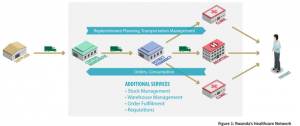- January 31, 2015
- 8:42 am
- John Caltagirone
- no comments
Rwanda’s Cloud-Based Pharmaceutical Supply Chain
One Network Enterprises, a supply-chain consulting company, recently released a case study on their work with the Rwandan Minister of Health to improve the health care network within the country. For numerous developing nations, external factors continue to be the main disrupter of any supply chain.
In the case of the Rwandan Ministry of Health, a number of external issues have delayed and disrupted on time deliveries of medical products and medicines to critical pharmaceuticals in the nation. Because the country’s terrain is highly elevated and much of the population lives mostly in rural areas of the country, it prevents products from being delivered on schedule Conditions like these along with unstable infrastructure, for example causing power and internet outages, hinder a proper functioning supply chain. Additionally, the system the Ministry of Health currently uses a paper-based system and manual processes, both of which, in terms of technological advancements, are outdated. One Network Enterprises was asked to intervene and collaborate with the Ministry of Health to create a more reliable service.
With the popularity of cloud-based processes trending only upwards in the past few years, One Network Enterprises proceeded to establish a similar set up using their Real Time Value Network. They created a system in which healthcare products would be delivered from the supplier to the warehouse to the district pharmacies and then distributed to the clinics and hospitals which is where the patient would receive it.The Ministry of Health now also has the ability to manage and track (in real time) of the custody and distribution of medical supplies from one end of the chain to the other. The flow of the product to the patient focuses primarily on replenishment planning and transportation management, while the flow from the patient to the supplier focuses on orders and consumption tracking.
Evidently these improvements and new processes have created not only transparency and reliability of the dispensary of healthcare products within Rwanda, but also allowed them to better track their costs, improved in-stocks at pharmacies and clinics, reduced waste, and most importantly, increased patient satisfaction.
Rwanda’s example mirrors a much larger shift in the supply chain management of the pharmaceutical industry. With rising healthcare costs, firmer regulation of manufacturing, the dual between OTC and generics and counterfeiting of medicines, the industry requires vigorous management of inventory and stronger logistical planning to develop and distribute pharmaceuticals.
For more information on the top 10 trends in pharmaceuticals effecting supply chain management, see One Network Enterprises’s White Paper: Top Ten Trends Transforming the Pharmaceutical Supply Chain.
-Riti Patel, Assistant, Supply and Value Chain Center
Source:
One Network Enterprises. African Healthcare Network Case Study: Rwandan Ministry of Health. Dallas. 2015. Online.
